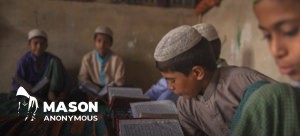Two years after exodus, Myanmar’s ‘desperate’ Rohingya youth need education, skills: UNICEF
The daily struggle to survive for Myanmar’s Rohingya people in one of the world’s largest refugee settlements, has caused “overwhelming” despair and jeopardized the hopes of an entire generation, the head of the UN Children’s Fund (UNICEF), Henrietta Fore, said on Friday.
In a report marking two years since the arrival of around 745,000 Rohingya civilians in Bangladesh – after fleeing State-led persecution and violence in Myanmar – Executive Director Fore appealed for urgent investment in education and skills training.
Here’s our full coverage.
Displaced by DRC violence, survivors’ testimonies highlight brutality of armed militia
Two months since hundreds of thousands of people fled violence in north-eastern Democratic Republic of the Congo (DRC), UN humanitarians warned on Friday that armed militia continue to make their safe return impossible.
Briefing journalists in Geneva, UN Refugee Agency (UNHCR) Spokesperson Babar Baloch, said that staff had heard numerous testimonies from people whose family members had been killed in Ituri province.
Severe underfunding for aid work and insecurity involving the Hema and Lendu groups have meant that increasing numbers are vulnerable and unable even to go home to pick up essentials, he added.
Read more here.
UN human rights office appeals to Zimbabwe to engage with protesters and ‘stop cracking down’
Zimbabwe’s authorities should heed their people’s grievances and “stop cracking down” on protesters, the UN human rights office, OHCHR, said on Friday, as planned protests in the capital were called off at the last minute.
The UN appeal follows a High Court decision to uphold a Government ban on the demonstration in Harare, spokesperson Rupert Colville told journalists in Geneva.
He added that crowds which had already gathered ahead of the ruling were dispersed by police, reportedly with force.
“With opposition demonstrations still likely to take place in Zimbabwe in the near future, we urge the Government to find ways to continuously engage with the population about their legitimate grievances on the economic situation, and to stop cracking down on peaceful protestors.”
Mr. Colville said that there was deep concern at Zimbabwe’s continuing socio-economic crisis, which has led to soaring prices for fuel, food, transport and health services, before calling for strong social protection measures for the most vulnerable.
According to the World Food Programme, (WFP) the country is experiencing its worst-ever hunger emergency.
More than a third of the rural population – some 3.6 million people – will be food insecure by October, the agency said on Friday.
‘Quash’ convictions and release women jailed for protesting against wearing veils in Iran, urge UN rights experts
Decades-long prison sentences handed down to three women protesting the strictly enforced wearing of veils in Iran, have drawn alarm and condemnation from six United Nations independent human rights experts.
“We are alarmed that the arrest and lengthy sentences handed to these women are directly related to the peaceful exercise of their rights to freedom of expression and assembly in the pursuit of gender equality in Iran,” the experts said in a joint statement on Friday.
The full story is here.
Environmental protection moves ‘closer to the people’ through new human rights agreement
The UN environment agency and human rights office (OHCHR) signed a landmark new agreement on Friday aimed at better protecting vulnerable human and environmental rights defenders and their families, while increasing protection for people and the places where they live, across the world.
The UN Environment Programme (UNEP) will strengthen cooperation with OHCHR, as threats to individuals and communities defending their environmental and land rights intensify. Reports suggest that an average of more than three rights defenders were killed every week last year.
Read more here.
Listen to or download our audio News in Brief for 15 August on SoundCloud:




![A girl wearing her hijab in Iran runs past a mural stating, in Persian, “God loves children who say their ‘namaz’ [prayers].” (File)](https://global.unitednations.entermediadb.net/assets/mediadb/services/module/asset/downloads/preset/16-08-2019_UNICEF-UNI125824_IranianGirl.jpg/image300x180cropped.jpg)

